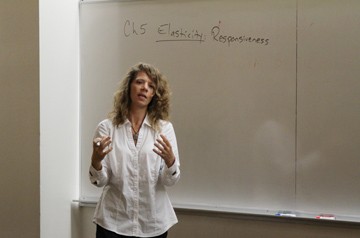
Editors’ note: In August 2014 SMU will debut the Residential Commons on-campus living model. Eleven Faculty-in-Residence were selected to live among students. This is part 11 of 11 FiR profiles.
Elizabeth Wheaton will join 10 other SMU faculty members to complete the Faculty-in-Residence program as part of the new Residential Commons to open fall of 2014.
An economics professor in Dedman College, Wheaton said she signed on to be a part of the program with the intention to further engage students across campus.
“I have about 200 students a semester, so I’m looking for ways to interact with them,” Wheaton said. “You can only do so much in the classroom.”
Wheaton sees this very specifically in working with first-years, for whom professors “can influence their lives quite a bit” as they step into a completely new environment.
The Faculty-in-Residence program will allow new students to be exposed to a variety of events, topics and success stories spanning a number of fields and areas of expertise.
“Anything the students might be interested in, we probably have it here,” Wheaton said.
“We have 11 Faculty-in-Residence…[which will allow] the students to see those different pieces they may not see because they’re in their major.”
In particular, Wheaton is looking to explore with students the concept of embodying SMU’s mission statement and growing to be a “world-changer.” From her experience running her own non-profit organization, Wheaton said, “a lot of the things [her organization does] is world-changing.”
“[Topics of discussion are] probably going to be…things perhaps a bit out of the normal,” Wheaton said. “Out-of-the-box ways you can do great things with whatever you’re doing.”
One issue in particular related to “world-changing” that Wheaton wants to bring to the forefront of discussion is diversity. She plans to bring in from the community “people that can speak to different aspects of” diversity, not just “from their experience, but from their training as well.”
In the interim before she officially moves into the Residential Commons, she is “working on those collaborations… now,” approaching ideal speakers and connections and finding out “their interest in getting deeply involved with the students.”
Aside from professors and persons of influence in the larger Dallas area, Wheaton explained that the sophomores who will remain on campus with the [first-year] beginning in the fall will be some of the strongest sources for exploring diversity and solidifying an environment of tolerance and equality.
“Coming into any population — whether you’re coming into college as a freshman or into the workforce after graduation — you don’t know the culture that’s there,” Wheaton said.
“As we’re working on different issues on campus, the sophomores…are going to have their experience from their first year.”
She elaborated on this, explaining that the sophomores are “going to be able to talk to the [first-years]” about their first year and their understandings of issues on campus and efforts to resolve or eradicate such challenges.
According to Wheaton, this mentor-like relationship will establish SMU community practices as “not just a rule to follow,” but also the background of “here’s where it came from.”
“That influences people to follow rules,” Wheaton said. “Because they have…experience to lean on.”








